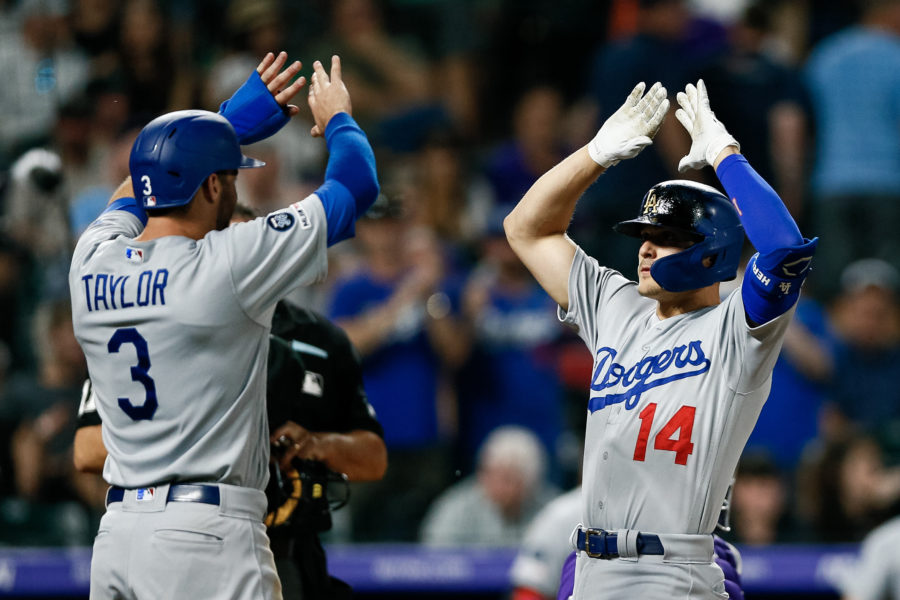It’s the easiest excuse in the book. The New York Yankees, Los Angeles Dodgers and Boston Red Sox all have more money, therefore, they’re better.
Only one is a Rockies’ rival and for the Dodgers, money isn’t a viable excuse.
As of Thursday night’s stunning loss, the Dodgers payroll ranked fourth in the league, seven spots above the 11th-place Rockies. The difference is roughly $49 million in overall sums put into their respective rosters.
The player that imploded for the Rockies was the third-highest paid closer in baseball, behind only Mark Melancon and the Dodgers’ Kenley Jansen. While Wade Davis’ acquisition came by way of a headline-inducing signing, Jansen was an amateur free agent pick up.
When called upon, the latter locked down the Rockies in the final inning, securing the Dodgers’ seventh win in as many tries this year against the hosts.
The two men who made the victory possible in the ninth inning were both Chris Taylor and Enrique Hernandez. Between the two, they make a combined $7.2 million.
Taylor, originally of the Seattle Mariners, was acquired in an under-the-radar trade for starter-turned-reliever, Zach Lee. Hernandez, also a product of a trade, was a piece sent back for Dee Gordon in a trade with the Miami Marlins.
Both were unheralded when received and have subsequently thrived since.
The other two that were largely responsible for the Rockies’ latest loss were Cody Bellinger and Max Muncy. Their combined salary falls just short of $1.2 million.
Between the five players that one could argue had the biggest impact in the game, Jansen is the only one with a large salary. The sum of all five sits at roughly $28 million. In other words, just above what Nolan Arenado will make this year ($26 million).
The counterargument of note is that it was just one game. In other games, the Rockies have fallen due to the Dodgers’ ability to overpay guys.
That point – much like the overall premise – is also false.
Clayton Kershaw, the Dodgers’ highest-paid player, has yet to face the Rockies this year. Their third-most expensive player, Justin Turner, has hit .290 against them, with only a single home run. Good numbers, but far from earth-shattering.
The discrepancy doesn’t lie in the sums that each club can dole out to players. If anything, the Dodgers have withheld from the exercise of making big signings. They let Manny Machado walk for nothing and sent away Matt Kemp and Yasiel Puig in the offseason.
For the Rockies, the problem is player development and the ability to add impact players that others don’t see.
The aforementioned Muncy is a prime example.
With the Oakland Athletics, the infielder had shown very little in the way of ground-breaking talent. In only 215 at-bats, he hit a mere .195 with the club, relegating himself to the minor leagues for the majority of his tenure in the organization.
After his release, the Dodgers came calling. In their minor league system, he was recalculated and set upon an upward trajectory. The swing improvements have been a boon to his career arc.
In 13 career games at Coors Field, he’s amongst a legend:
After today, the @Dodgers' Max Muncy has a 1.184 slugging percentage in 13 career games at Coors Field.
That's the highest SLG by any player in his 1st 13 career games at a park (min. 40 PA) since Joe DiMaggio slugged 1.220 in his 1st 13 games at Sportsman's Park in St. Louis.
— OptaSTATS (@OptaSTATS) June 28, 2019
Both Hernandez and Taylor were also players that weren’t known commodities. Joc Pederson was an 11th-round pick, while Bellinger was a more highly-touted fourth-round selection. Even Turner was a free agency snag after a mediocre pair of stints with both the Orioles and Mets.
Among all of them, not a single one was brought in based on the Dodgers’ ability to pay more. They were brought in by a high-level front office and manicured in the club’s powerhouse minor league process.
The excuse was valid when the Yankees’ payroll was more than double the Athletics’. It was even a just argument when the Tampa Bay Rays lost out in the American League East battle last year, despite winning 90 games.
For the Rockies and their embattled search for key free agents, the financial deficit isn’t the problem. The slowed development of prospects, inability to find headline talent deeper in drafts and trades that result in nothing are.
Some times, a team is simply better and an organization reigns superior.
The Dodgers are playing chess, setting themselves up for a repetitive checkmate. For the foes, they’re relegated to merely playing checkers.
